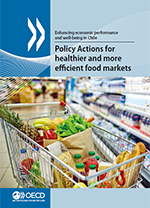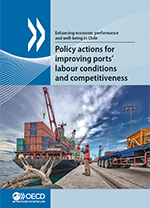Chile Economic Snapshot
Economic Forecast Summary (November 2022)

Economic Outlook Note - Chile
Growth is expected to slow to 1.9% in 2022. A 0.5% contraction of output is projected for 2023, followed by growth of 2.6% in 2024. Tighter financial conditions, the withdrawal of pandemic-related support measures and the eroding effect of inflation on purchasing power will dampen household consumption. Higher interest rates and low business confidence will keep investment subdued.
©Shutterstock/Karabin
Read full country noteEconomic Survey of Chile - September 2022
Chile’s economy recovered swiftly from the pandemic on the back of exceptionally strong policy support, which eventually led to a significant overheating of the economy. Inflation has risen amid buoyant private consumption, further aggravated by the Russian aggression on Ukraine. Monetary authorities have acted in a timely and decisive fashion to contain inflation, and the fiscal stimulus is being withdrawn. Significant underlying challenges will have to be addressed over the next years, including stagnant productivity and high inequalities. Strengthening competition, reducing regulatory barriers and spending more on research and innovation will be key priorities for boosting productivity and investment, while pressing social needs call for more attention to how incomes and opportunities are distributed. Around a third of the workforce is in informal work, which limits their access to social protection benefits. Ensuring a well-defined set of benefits for all, with no distinction between formal and informal workers, will be key. Expanding access to high-quality early childhood education would improve educational outcomes and allow more women to work. Environmental challenges and risks loom large, but also provide significant opportunities for the future. The current high fossil content of the energy matrix contrasts with Chile’s strong potential in renewable energy generation.
Executive summary
Presentation
Summary video
Reform Priorities (April 2021)

Going for Growth 2021 - Chile
The COVID-19 pandemic exposed long-standing economic vulnerabilities: high inequality and a high share of small and mid-size companies with weak productivity performance. Solid COVID-19 related government interventions are cushioning some of the negative effects, but structural policy action is needed to prevent the crisis effects undoing some of the progress in reducing poverty and inequality achieved through the past decades and to strengthen economic resilience and growth in the future.
©Shutterstock/Anton Petrus
Read full country note2021 Structural Reform Priorities
- Education and skills: Improve quality and equity of the education system
- Labour market: Enhance lifelong learning and active labour market policies, while boosting female labour participation
- Social protection: Make the tax and transfer system more friendly to redistribution
- R&D and digitalisation: Boost the digital transformation
- Competition and regulation: Enhance competition and ease regulatory procedures
Enhancing economic performance and well-being in Chile (March 2021)
Strengthening competitiveness, productivity and well-being is a key priority for the Government of Chile. To support this effort, the OECD provided Chile with policy advice on how to enhance the economic performance and well-being in four strategic sectors of the Chilean economy: pharmaceuticals, food, ports and telecommunications.
The four reports examine the main challenges of each sector in an intersectoral manner and provide targeted recommendations with concrete policy actions for implementation in the short, medium and long term. In particular, topics include the affordability and accessibility of Chile’s pharmaceutical market; efforts towards healthier and more efficient food markets; ports’ labour conditions and competitiveness and policies for a more dynamic telecommunication sector. Through its analysis of the main challenges in the Chilean health and network sectors, the project thus contributes to the development of a set of co-ordinated structural reforms for improving the country’s economy and peoples’ lives.
The policy actions were developed by a multidisciplinary OECD team with experts from the Economics Department, the Trade and Agriculture Directorate, the Employment, Labour and Social Affairs Directorate, the Science, Technology and Innovation Directorate, the Public Governance Directorate, the Financial and Enterprise Affairs Directorate, and the International Transport Forum.
Assessing Chile’s analytical framework for long-term fiscal sustainability (October 2020)
Independent fiscal institutions are key in supporting well-designed fiscal frameworks that ensure long-term sustainability of public finances and adequate fiscal space to meet country needs. The Autonomous Fiscal Council (Consejo Fiscal Autónomo, CFA) is Chile’s independent fiscal institution tasked with contributing to the responsible management of the central government’s fiscal policy. While still relatively young as it started operating in June 2019, the CFA has already established itself as a respected institution relying on a wide range of analytical tools. In the current context, marked by a sharp increase of public debt, it is key to ensure that the models and tools used by the CFA remains “fit-for-purpose” and aligned with international best practices and standards. This report presents advice on how the CFA can further strengthen its models and tools. The report is the result of the work of an interdisciplinary OECD team bringing together expertise on country analysis, macroeconomic analysis and policy advice from across the Economics Department.




